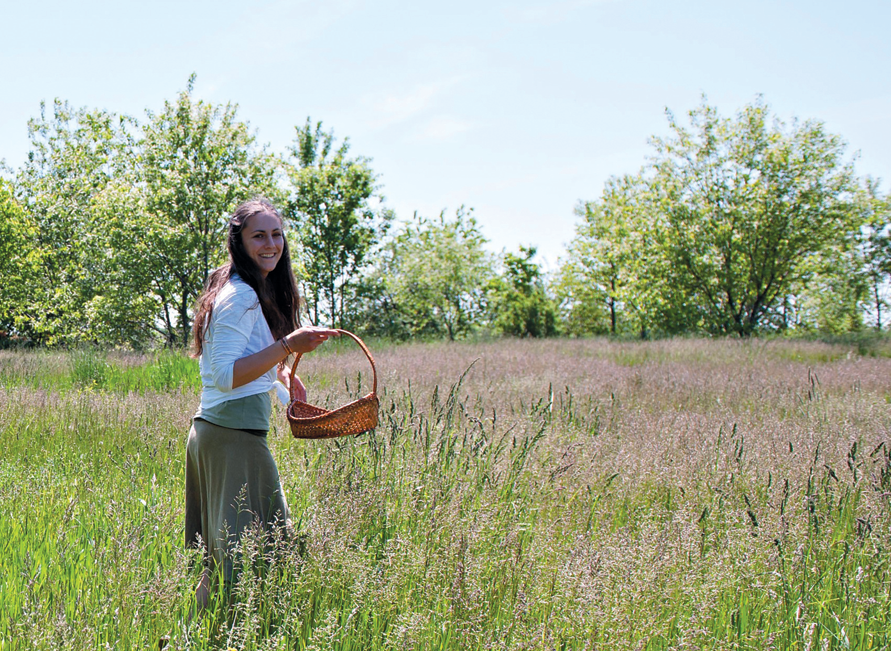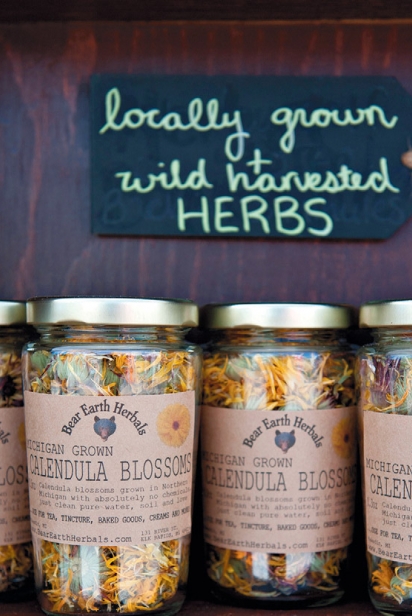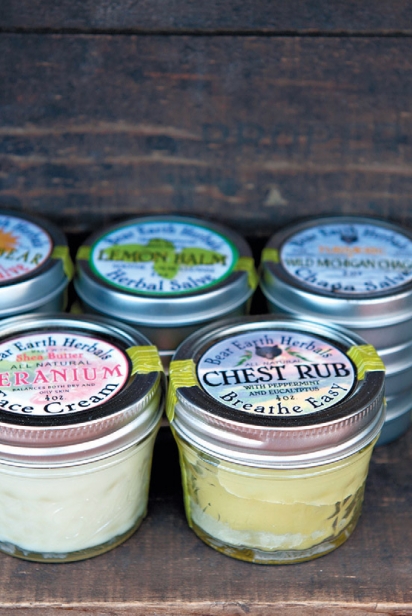Wild Thing: Bear Earth Herbals
Local herbs are the lifeblood of Bear Earth Herbals, a tea and body-product company whose founder wants Northern Michiganders to fall in love with the plants that flourish here.
You’ve probably spotted Sierra Bigham’s colorful tins and tea packets at a local farmers’ market or food co-op. There are blended teas showcasing ingredients like clover or mint, rose petals or Chaga mushrooms. Salves, muscle rubs and lip balms might star plantain or comfrey. Many of the ingredients were harvested wild in Northern Michigan, and many others were organically cultivated here.
“My passion is the plants—creating synergistic combinations and showcasing their personalities, not just creating flavor,” says Bigham, a lifelong wild plant enthusiast and herbalist. “I want people to get excited about the abundance we have here. I find it to be just as important to use local herbs as it is to eat local foods.”
Bigham, her sister, and her partner grow some of the ingredients themselves. Others they source from local farms or harvest from “pristine” areas around Northern Michigan. They cold-infuse fresh herbs in the base oils for about two months, a process whose refinement took Bigham a decade of trial and error before she started the business.
“I’m really passionate about not cutting any corners for quality,” she says.
To create its loose-leaf infusions, the Bear Earth team dries and then hand-processes ingredients.
“You can actually see the flower petals or the leaves,” Bigham says. “That separates [Bear Earth products] from commercially produced teas and increases the quality a lot, because they’re not exposed to so much air. They’re not broken down, and they’re a lot fresher, too. A lot of the tea that you get in the store has been sitting on the shelf already for a year by the time it gets to you.”
Still, you may notice that Bear Earth products don’t have a strong scent. That’s on purpose, Bigham explains.
“We use really small amounts of essential oils, and I feel like that does set them apart from other products,” she says. “I like to use large amounts of whole fresh plant material [instead]. I do that to make them very safe, because essential oils, I think, are often overused and not regarded with enough respect for their extreme potency. One drop of essential oil is way more plant material than you would ever consume normally. You don’t get the full synergy of the plant that way either.”
Bear Earth also does its own packaging in its licensed kitchen in Elk Rapids.
One of Bigham’s favorite products: a salve with St. John’s Wort and white cedar in beeswax. “I like to do some of our salves really simple—just single herbs or small combinations. I feel like it helps people establish a relationship with those plants,” she says.
Their new Bent Oolong tea (get it?) mixes holy basil, sweet basil and Thai basil with organic fair-trade oolong tea. (The Bear Earth team is fond of punning.)
With deep roots in the community, Bigham works with a number of retailers and growers around Northern Michigan. Her beeswax comes from area beekeepers Bob Bernard and Greg Griswold, while Short’s Brewing Company provides hops. Taproot Cider House infuses one of its drinks with her Wild Bear Ease tea (raspberry and strawberry leaves, elderberries and elderflowers and sumac berries). And she’s working with Elk Rapids brewer Ethanolo¿y to create a wild Northern Michigan gin. It’ll have local juniper berries, sumac berries, burdock root and yarrow flowers, among other wild botanicals.
Bigham grew up near Kalkaska with her home across the street from state land. She spent much of her childhood exploring the forest, announcing at age 7 that she wanted to move there. Wisely, her mother suggested she wait till she was 9, by which time Bigham was no longer sure she wanted that adventure. Three years later, she knew she would spend her life working with plants and began to study their medicinal properties. And at 16, she did move into the woods—the Hawaiian rain forest, to be exact.
For over four years, she made her home in a forest in Kauai, sleeping outdoors and gathering much of her food from her surroundings. She continued to learn herbal medicine and worked on farms and botanical gardens.
Living so close to nature was, she recalls, a life-changing experience.
“I developed such a love for plants and such a strong relationship with them,” Bigham says. “I began to see them as people.”
After moving back to Michigan in 2012, Bigham raised capital by cleaning houses, then launched Bear Earth Herbals in 2013.
Its first product: a white pine lip balm, which blends beeswax with organic olive oil infused with wild-harvested white pine needles.
“It’s unique and it’s subtle and it really says Northern Michigan to me,” Bigham says.
The company’s first tea, Mother Bear, combines wild mint and raspberry with chamomile and jasmine. “My sister said it tastes like you’re drinking a hug,” Bigham says. (For a wide-awake embrace, there’s also a version blended with organic fair-trade black tea.)
Bigham avows a strong commitment to sustainable harvests.
“With the rise of interest in foraging, it’s become so popular I have concerns [about] overharvesting,” Bigham says. “Just because we don’t have to pay money for it doesn’t mean it’s free.”
As such, she won’t say where she does her own wildcrafting, but she says she takes care to avoid polluted areas (orchards, with their heavy pesticide loads, are a big offender) and only forages where she’s permitted to do so.
Bigham also makes a point of giving back to the earth and plants each time she forages. She may sprinkle seeds or otherwise help a (native or naturalized) plant spread, or pull away invasives. Sometimes she offers tobacco after the Native American custom. Other times she pours water onto the earth or sings a song.
“When we harvest from them, we need to remember that we’re taking the life of another living being,” Bigham says. “Especially if we’re using that as medicine or for food, harvesting with gratitude will make that much better for both you and the plant.”
Education allows her to offer another kind of reciprocity. Bigham has taught would-be wildcrafters at the Northern Michigan Small Farm Conference, Notably Naturals in Traverse City Commons, Earthwork Farm in Lake City, Providence Farm in Central Lake, and other venues.
“It’s my way to give back to the plants,” she says. “It feels good to teach others about sustainable wild harvesting practices and to raise awareness about the sentience of plants.”
In her classes, Bigham emphasizes both the diversity and the vulnerability of Northern Michigan’s plant communities.
“We’re right between the equator and the North Pole, so we get a unique set of plants growing here,” Bigham says. “It’s just warm enough to have diversity but just cool enough to be perfect for a lot of the temperate herbs. There are some plants that grow here in Northern Michigan that don’t grow anywhere else. They’re of great value to humankind and to the bioregion—they’re not just here for humans, but we don’t even know the depth of the roles that they play in their bioregion.”
“It’s extremely important that we try to keep as much diversity on our own land as we can, each as individual stewards—turning your lawn into a pollinator habitat, letting some of the diversity come back,” she adds.
And what was that about sentience?
“Plants are people too,” Bigham says. “They have brain-like systems in their roots. They have respiratory systems, they have circulatory systems, they take care of their offspring. It’s actually believed that they have somewhat of a memory and are able to process things in a similar way as our brains. They have a very intricate communication system through the mycelial (fungal) web that’s under the ground that’s equivalent to our internet in its capacity and how advanced it is.”
Ask Bigham what her favorite plants are, and she’s hard-pressed to choose.
“I have so many,” she says.
“I really love yarrow. That was the first herb that I ever studied,” she recalls. “White pine trees are definitely one of my best friends. Violet—I’ve always known her, but most recently we’re becoming better friends. And the tamarack trees also. I’ve begun quite a juicy relationship with the tamarack trees this year.”
For those who want to deepen their own relationship with the botanical world, Bigham recommends choosing a single plant to start with.
“Sit with it. Listen to it. Find it growing near you. Maybe grow it in your own garden or in your own yard. Maybe draw it. Observe it keenly,” she says. “I like to do all those things before I ever harvest any or start to use it.
“It takes a long time to get to know a plant, just like it does take a long time to get to know a person. You can’t just walk into a room full of people and get to know them all in one sitting. It takes many years of seeing them in different environments, doing different things with them and spending a lot of time just listening, to really understand the full beauty of a being and the depth of their personality.
“There is just an infinite amount to learn about each plant,” Bigham adds. “The more I learn, the less I feel like I know.”
Bear Earth Herbals can be found at farmers’ markets in Traverse City, Charlevoix, Elk Rapids and Interlochen. Retailers include Oryana Natural Foods Market, Notably Natural and Higher Self in Traverse City; the Grain Train Food Co-op in Petoskey; and shops in Kalamazoo, Flint and East Lansing. Find them online at BearEarthHerbals.com.






